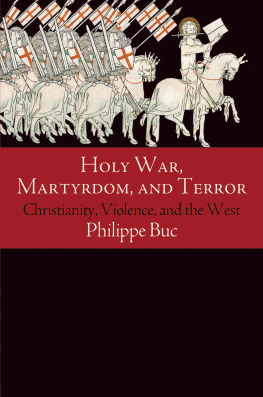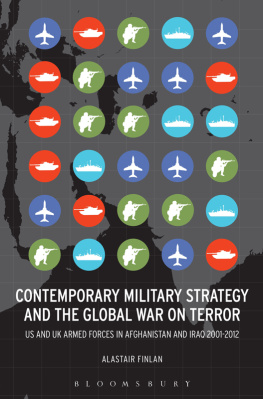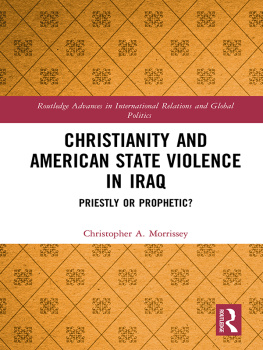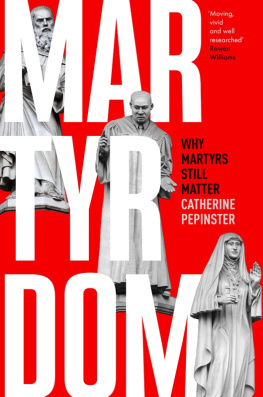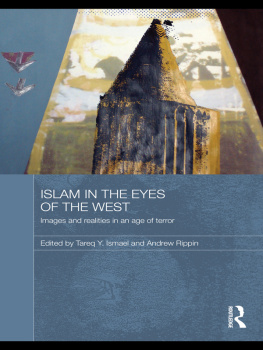Contents
Page List
Guide

Holy War, Martyrdom, and Terror
Holy War, Martyrdom, and Terror
Christianity, Violence, and the West, ca. 70 C.E. to the Iraq War
Philippe Buc

UNIVERSITY OF PENNSYLVANIA PRESS
PHILADELPHIA
A volume in the Haney Foundation series, established in 1961 with the generous support of Dr. John Louis Haney
Gedruckt mit Untersttzung der Historisch-Kulturwissenschaftlichen Fakultt der Universitt Wien
Copyright 2015 University of Pennsylvania Press
All rights reserved. Except for brief quotations used for purposes of review or scholarly citation, none of this book may be reproduced in any form by any means without written permission from the publisher.
Published by
University of Pennsylvania Press
Philadelphia, Pennsylvania 19104-4112
www.upenn.edu/pennpress
Printed in the United States of America on acid-free paper
10 9 8 7 6 5 4 3 2 1
A Cataloging-in-Publication Record is available from the Library of Congress
ISBN 978-0-8122-4685-8
Contents
Preface
I began writing on this themeChristianity and violenceat the edge of the desert. The setting was Morocco, 20012002. The occasion was an Arabic-language collective volume devoted to the violence and the religions of the book, where I traced for a local audience some longue dure themes in the Western understanding of coercion. The trigger was an attempt to understand, like many others but as a medievalist, the by then already clear march to war. The medievalist realized, to his surprise, that he could make sense of some of the American presidents language. It became clearer, somehow, for instance, when set next to the letters of Pope Gregory VII. The enterprise mushroomed in the direction of a book when I gave a talk in 2004 at the cole Franaise de Rome on Gods Vengeance, attempting to show the advantages of an exploration of First Crusade sources in the light of biblical exegesis. The question then became: What can traits specific to Western Christianity (and transported over time into less religious, post-Christian Western cultures) explain about mass violence in the West? As will become clearer to the reader in the course of his or her reading, it is a thought experiment concentrating on religion and ideology as conditions of possibility and leaving aside other factors at play in violence. The essay has also ended up focusing on Western bellicism to the detriment of Western pacifism, which these traits admittedly also help explain.
The bulk of the examination was conducted between 2004 and 2011, while I taught at Stanford University; and also on sabbatical in 20052006 at Yale. Some of my teaching fed into the researchin particular a course taught with Amir Weiner titled Mass Violence in History and a graduate seminar on secularity, which was accompanied by a small international conference on the topic.
Since I began thinking about this topic, powerfully conceptualized books have appeared focusing on medieval violence, a period central to this essay. Pride of place go to Norman Housleys splendid Religious Warfare in Europe 14001536 (Oxford: 2002), published as I began my research (a work much more nuanced than this text can ever be), and to several works by Jean Flori. I consulted Jay Rubensteins elegant Armies of Heaven (New York: 2011) too late to benefit fully from it, but there was much convergence between his work on the First Crusade and mine, simply owing to our both being students at Berkeley of the late Gerry Caspary. Among books fundamental for this study should also be mentioned three works devoted to the early modern French wars of religion, all three by Denis Crouzet. To him I owe both concepts and beautiful sources. My debts to Crouzet and Housley, when detailed, would overtax the endnotes. Yet, in almost all cases in which I use primary sources cited or discussed by colleagues, including Crouzets, I have followed these texts back to their original or critical edition. Some colleagues may find my footnotes not fully up to 2014 standards. There is a dual explanation for this. One, the bibliography is ever-growing. Two, I pretty much stopped consulting an ever-growing historiography in 2009, concentrating on conceptualization and writing. By September 2011, I had moved to the University of Vienna, which did lead to a little more reading in German-language historiography. Duties there, however, prevented greedy assimilation of great masses of materials, for which the Press, ink-spitting squids, and trees will likely be grateful.
Introduction. The Object of This History
Well, to compare like with like, the majority of our educated class is now suffering from an Abderite epidemic. They are not stage-struck, indeed; that would have been a minor infatuationto be possessed with other peoples verses, not bad ones either, no. But from the beginning of the present excitementsthe barbarian war, the Armenian disaster, the succession of victoriesyou cannot find a man but is writing history; nay, every one you meet is a Thucydides, a Herodotus, a Xenophon. The old saying must be true, and war be the father of all things, seeing what a litter of historians it has now teemed forth at a birth.
Fabula de te narratLucian of Samosatas second-century C.E. fable speaks about us. There was (and is) a war, Heraclituss father of all things (polemos hapantn pater), and many among us scholars took not the sword but the pen. How is the pen wielded for these pages? The historians intended craft is best delimited, initially at least, through negatives and caveats.
Ambit and Approach: Western Religious Forms and Violence
This essay explores two millennia of Western Christian and post-Christian violence in the West. In violence are included holy war, terror and terrorism, and (paradoxically as it may seem at first) martyrdom.
Islam has been mentioned. This authors lack of expertise makes him shy away from definitive pronouncements on Muslim violence. There is a further ground for caution: since the nineteenth century and in particular G. W. F. Hegel, the intellectual histories and analyses of exalted European movements and of Islam have cross-contaminated one another to the point that Islam (including modern Muslim fundamentalisms), Bolshevism, and the French Revolution have been assimilated to one another, or so tightly compared as to imply some subterranean identity or intimate affinity.
This lesser but still high level of generalizationacross the whole Christian and post-Christian Westmay seem vulnerable to the sort of critique just levied against the Girardian school. There are indeed undeniable and significant differences betweento name just a few political culturesCivil War England, Revolutionary France, crusader Catholic Europe, New Left 1970s Germany, and America from the seventeenth century onward.
Second, the discussion has to tread lightly but precisely around the concept of secularization. By this is not meant what popular usage shares with an important strand of serious scholarship, that is, the fact that formal and informal religious institutions have lost centrality in and influence over culture, society, and politics, and that religion has become increasingly relegated to the private sphere, along with various forms of separation of Church and State. How to take sides in this debate? In some complicated middle, as is often the case. It stands to reason that, while Blumenberg may be right for some Modern notions, which are by no means secularized premodern ideas, Schmitt and Lwith may be right for others.

